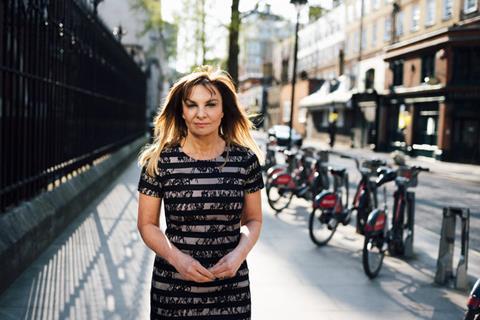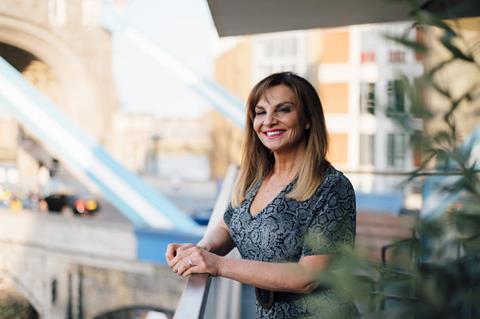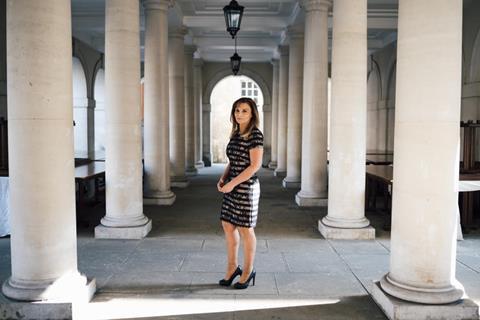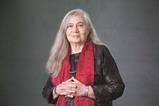The founder of Christian Concern believes the Church has failed to stand up for gospel truth. She tells Sam Hailes why neither criticism nor cancer has stopped her from speaking out on everything from Islamic extremism to abortion.

Last month a video of a street preacher being arrested outside a London tube station went viral. “Don’t take my Bible away!” Oluwole Ilesanmi protested as officers handcuffed him and led him away. Within days, the campaigning organisation Christian Concern had taken on Mr Ilesanmi’s case. It successfully challenged the police’s version of events (the Met initially claimed the preacher had been walked out of the area, but were later forced to admit he’d been driven miles away). Christian Concern’s petition to the home secretary asking Sajid Javid to “protect street preachers” quickly garnered more than 10,000 signatures. It also set up media interviews for Mr Ilesanmi and arranged for him to visit the Mayor of London’s question time, where he was able to demand action from Sadiq Khan.
This is just the latest in a string of high profile cases that Christian Concern has taken on over the past decade. They boast a 100 per cent success rate when it comes to ensuring street preachers are not prosecuted, while their sister organisation, the Christian Legal Centre, has supported Christians who have found themselves in court. You may remember the case of Sarah Kuteh who, according to Christian Concern, was fired by the NHS for “talking to patients about her faith and occasionally offering prayer”. Or Richard Page, the former magistrate who was sacked after authorities deemed his comments against gay couples adopting children to be “biased and prejudiced”. Or Jeff and Sue Green, who were accused of discriminating against same-sex couples by operating a ‘married couples only’ policy for their double rooms at their guesthouse in Wales.
Originally styled Christian Concern For Our Nation, it is now one of the most prominent evangelical organisations in the UK, reaching a “growing mailing list” of 43,000 people, and regularly campaigning on all the hot topics some other Christians might prefer to ignore. I was eager to meet the woman who founded it.
Andrea Williams, 53, is intense, driven and uncompromising. She often refers to Jesus as “the Lord Jesus Christ” and believes Christians have been “ashamed of the gospel” for too long. She does not mince her words, and has no problem interrupting and correcting any questions she feels are unfair. Her many fans in the conservative evangelical world praise her courage and bravery in standing up to journalists like me. And she’s certainly become more adept at speaking to the media. When Channel 4’s Dispatches interviewed her in 2008, she appeared flustered and was often caught off guard, but during our hour-long conversation she gave as good as she got when the heat was turned up.
Born and raised in Devon, Williams was just eight years old when she felt a call from God to be a barrister. After studying Law at Cardiff University and Italy’s University of Pisa, she worked at the bar for seven years, before joining the Lawyers’ Christian Fellowship, from which Christian Concern grew.
Behind closed doors, a number of prominent evangelical leaders are critical of Christian Concern’s tone. They are reluctant to talk on the record, but there’s a general perception that Christian Concern have fallen into the trap of being known for what they’re against (abortion, same-sex marriage, Islam) rather than what they’re for. Some also wonder (in hushed tones) if they’ve been too eager to take on cases that might have been best left alone. Is it possible that some Christians have been unwise in the way they’ve spoken about their faith at work, and have in fact overstepped the mark? Critics point out that once cases reach the courts, it’s rare for Christian Concern to win.
Williams’ belief that Christian freedoms are under attack in this country is unwavering. She says some of the high-profile cases she’s been involved in have led to an atmosphere where believers are “more inclined to keep quiet”, perhaps fearing a misplaced word or phrase could cost them their job. It’s a huge issue, and there isn’t a consensus on how Christians should respond (for other responses to secularism see p44). When the Lawyers’ Christian Fellowship partnered with the Evangelical Alliance to produce a booklet called Speak Up, their message was quite different to that of Christian Concern’s. They argued that Christians do in fact enjoy “many rights and freedoms”, including when it comes to evangelism. The booklet’s preface read: “The occasional cases of overzealous regulation and misplaced fervour we hear about should not force us into a corner and cause us to stop sharing the good news.”
Given her prominence as an outspoken Christian voice in the mainstream media, Williams is often on the end of strong, often hurtful, criticism. She’s weathered other storms too, not least a battle with cancer. I wanted to find out where her tenacious spirit comes from and what keeps her going on the tough days.

Have you ever doubted your faith?
When I was growing up I so loved the Lord Jesus Christ that there was no way that I was going to rebel. I wanted to go to church and be a witness for him. But as I grew older the idea that anybody would be lost to hell crippled me. I couldn’t bear the idea of anyone being there.
When I was a teenager, I lost three friends to death in one week. One was a young man who was a couple of years older than me. He used to say: “I’m gonna marry you one day. I love you.” He had a terrible accident on his moped and he died. I was just heartbroken. I remember that absolutely devastated me.
In the same week, a young man at school died in a windsurfing accident, and a friend who was disabled died. I remember shutting the door of my bedroom and wailing and crying for a long time and not eating. There was this feeling of: “I can’t look at the Bible, this is too much to bear and I can make no sense of this.” I made myself so upset and unwell over those couple of weeks. It wasn’t until I gave in and allowed the peace of God to enter my heart and soul again that I could find the peace that only God can give. But those experiences were formative. The urgency of the hour, the importance of the truth.
After an experience like that, one might think the next step would be to become a missionary or an evangelist. But you actually studied Law at university. Why was that?
When I was aged eight and at home with chickenpox, I watched Crown Court on TV and I said to my mum: “When I grow up, I’m going to be a barrister, and I’m never going to change my mind.”
So every night I would pray on my Basil Brush carpet by my bunk bed, saying: “God bless mum, God bless dad, God bless Sam the cat,” and there was a PS, “and please, Lord Jesus, if it is your will, can I pass the eleven plus, so that I can go to the grammar school, so that I can become a barrister.” I prayed that prayer every single night without fail. And the Lord granted me the desire of my heart.
You’ve worked with Christians who have lost their jobs for sharing their faith in a way that was deemed inappropriate. Some people might be wondering: how far can I go before my evangelism is deemed pushy and I lose my job?
Well, I think with some of these cases, you couldn’t make them up, to be honest. That’s the world that we live in, and the impact of this generally in our culture is that Christians are more inclined to keep quiet and more inclined to withdraw. Or more inclined to think twice before sharing their faith at all? Well, I have to say this… we now have hundreds and hundreds of clients who have come through and not one of them says: “I wish I hadn’t done that.”
Even those who’ve lost their jobs?
Yeah, because they know where they stand, and their faith has been strengthened as a result of it. You know, we don’t create these cases. This is not a climate that we’ve created. This is not how I imagined my life was going to be. People come and find us.

If someone were to ask me for a description of Christian Concern, I might be tempted to say: “They’re the organisation that take on all the really difficult issues that, frankly, most other Christian organisations would rather not touch, because they’re culturally difficult, or perhaps politically incorrect.” Is that a fair description?
Martin Luther said: “If I profess with loudest voice and clearest exposition every portion of the truth of God except that little point which the world and the devil are at that moment attacking, I am not confessing Christ, however boldly I may be professing Christ.”
When God’s very image is under attack, when being male or female is under attack, when marriage between a man and a woman is under attack, when his uniqueness is under attack... Then I am compelled to speak his truth because I believe that is gospel work. If we leave this nation in chaos, then we’ll get to an end state culture where the conscience is dulled, where people cannot know him. And if we allow Islam to rise then our very freedom to preach the gospel will be under attack. When you’re dealing with, as I have in the last few weeks, a woman who was subjected to an Islamic gang and held captive for 13 years; and raped every night for six years; eight forced abortions and the State doesn’t know what to do…
Isn’t the answer that we need to be preaching the gospel and seeing people come to Christ? Once that happens, there will be more Christians in parliament, and so our laws would begin to change and reflect a more Christian worldview, wouldn’t they?
Doing the one-to-one work and seeing people come to know the Lord Jesus is fantastic. I lament that I haven’t got time to do what’s needed in one-on-one situations anymore. But it’s not just that we seek to bring individuals to Christ. We’re also called to go and win nations for Jesus Christ. So we cannot narrow the gospel.
So the gospel is more than an individual accepting Jesus dying for their sins? For you, presenting the gospel includes campaigning on political or legal issues such as abortion, euthanasia or marriage?
It’s about seeing the gospel as the structure of truth, and that truth is good for the whole of humankind. Jesus talks about not being ashamed of him and his words. So when we contend on abortion, we contend for the most vulnerable in our society; over 9 million babies missing since the act was passed and millions more embryos that have been made that have been destroyed. That’s a lot of people.
Haven’t most Christians given up trying to change the law on abortion?
No, I think what’s fascinating is there’s a rising young and vibrant generation that love the Lord Jesus Christ, and they see this issue as absolutely vital, and we need to repent. There’s a growing movement of Christians who want to make abortion history.
Our conscience has become so dulled; unless we speak of these things we can’t begin to weep for the things that we’ve allowed. When you really care about the most vulnerable person in your society, that’s the mark of a civilised society. We will see a turn, we’ll see a softening of hearts.
Are Christians a minority or a majority in this country?
Those that will really live and die for the Lord Jesus Christ are a small minority. There’s quite a lot of people that might tick a box.
The reason I ask is because we’ve seen minority groups in this country have a disproportionately large effect on certain laws. So for example, the LGBT community, although a minority, have successfully campaigned to change the law on marriage. So why haven’t Christians – if we’re a minority group – seen success on the issues we’ve campaigned on?
I think that can only really be explained in spiritual terms. I think it’s a spiritual battle. And that’s why we need to hold firm to the gospel, stand firm and understand the spiritual warfare that’s going on in the culture.
What has been Christian Concern’s biggest success in the courts?
What is the greatest marvel? What is the greatest achievement? It is that we exist!
There’s not a particular case you’d pick out?
It is that we keep pressing on. That no matter what is thrown at us, what I can really say in all of this is that we sought to speak the truth of the Lord Jesus Christ.
But you wouldn’t pick out a particular example?
No, because actually losing is winning, if you see what I mean, because actually what matters is to contend for the gospel where it is under attack, and to seek to witness the truth, and we must do that bravely, but we must do that wisely.
A cynic might say if losing is winning, that’s great for the fundraising strategy! If you’re fighting an unwinnable case in the courts, and you do lose, you can tell your supporters, “This proves the system is stacked against us! We need your support to keep fighting the good fight.”
Money is just not in my head. Seriously, it’s not in my head. I can honestly say this – that almost since our existence, every penny that has come in has gone right back out for the cause of the gospel. And almost every month, every penny that comes in goes right back out. And at the very beginning, sometimes we’ve faced big bills, and I’ve not known how we’re going to pay them, and the Lord has never let us down, and it is miraculous.
Is there a particular figure or role model who you see yourself as following in the footsteps of?
I think what’s interesting about this work is – and this has been a surprise – it wasn’t modelled before me. It didn’t exist before us.
How do your children feel when you’re on mainstream news channels and on the receiving end of some very aggressive questioning?
I think they’ve not known anything else. I pray for them all the time, they are my normality. They hold me up, they make fun of me, they do all of those things...and sometimes they get cross, sometimes they get upset. They see me at my worst, they see me weep, they see me hurt, they see me in the vulnerability...Sometimes those setbacks make me not so nice, so they sometimes see a rawness that is a bit unfiltered, and not as godly as it should be.

You’ve been through quite a recent cancer battle. But even that hasn’t stopped you, has it?
It is now about ten years since my first diagnosis, and I was fit, but it came back out of nowhere, and I got really sick, at one point was close to death. And there was no money in the bank at Christian Concern. I thought that was it, and the staff at the time said: “We’re not giving up, Andrea, we’re never giving up, not till there really is no money in the bank.” And we’re still here. So I never think this work belongs to me. I’m always the privileged participant.
You’re a member of the Church of England’s General Synod, yet you aren’t afraid to criticise your own denomination. Why are you still a part of the CofE – wouldn’t you feel more at home elsewhere?
I don’t want to always lay the blame with the Church of England, but you know, where are the other denominations in terms of really speaking to the king? Where are the Baptists, where are the Methodists? Where is the Free Church, where are all the Pentecostals? Where are any of us? Where is our united voice to say that marriage is between a man and a woman; that we are male and female; that Jesus Christ is the way, the truth and the life, no man comes to the Father but by him?
We are scared about Twitter feeds. We are so concerned about appearing to welcome, to reflect the culture, as opposed to contend and set the culture, which is what our forefathers did when they took the gospel to other nations.
You know, Britain has a great and wonderful history – it’s the Lord’s history. It wasn’t because we were British that we were great. It was because our systems – of course, humanly flawed – but our systems contended for Christ, whether in our parliamentary system, or judicial system, our education system, our health system. And it worked. It’s the gospel.
Do you worry that sometimes as Christians we have a reputation for what we’re against, rather than what we’re for?
In order to be for something, sometimes you’ve got to be against something. I am so for people, I am so for seeing people being all that they can be in the Lord Jesus Christ. I am so for restoration, and healing, and beauty, and lack of harm, and lack of guilt, and the truth that sets us free. I’m so for the Lord Jesus Christ, and I am so against the devil and his tissue of lies that is wrapped around this nation and is basically robbing, through our institutions, through our laws, the innocence of our children – it’s messing us up, it’s messing with our heads!
I get out of bed every morning thinking that no matter what the world throws at me, I know my heart. And I know the heart of the people that work with me, and I know that they love, and I know that we can’t be in places and situations where we always try to explain ourselves. Unless you live our cases you can’t understand all the twists and turns and things that are said and not said. You sometimes get a judgement which is very often a complete distortion of the facts. I’ve sat through so many. If we had all the words in all the world, all the time, air time, in all the world, we couldn’t explain ourselves right.
Is the system stacked against you?
There is a sense in which it might feel like it. But Jesus wins in the end.
To hear the full interview listen to Premier Christian Radio at 4pm on Saturday 18 May or download The Profile podcast premierchristianradio.com/theprofile






































